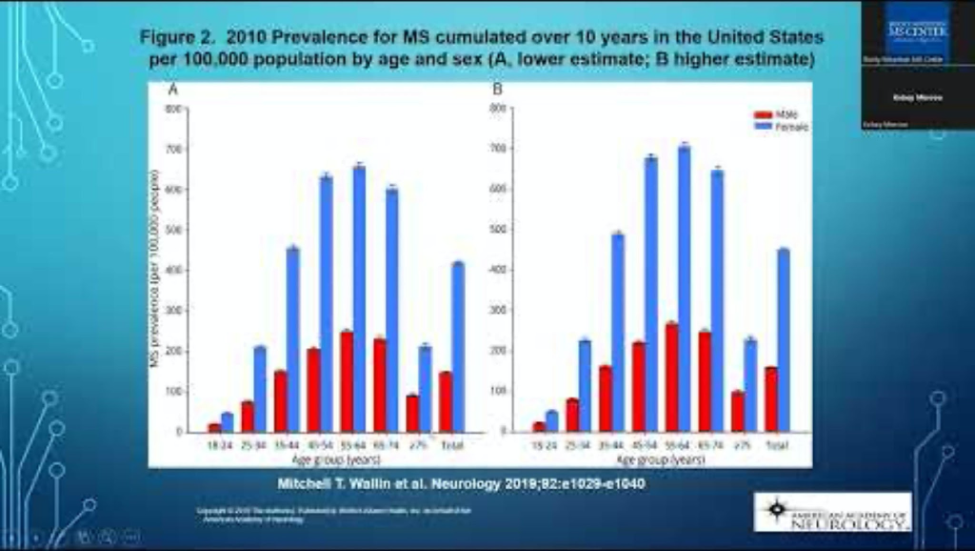Research Projects
Results from research studies are the evidence that drives improvements in diagnoses, treatment and the healthcare and quality of life of people affected by MS.
This Research Projects area of the iConquerMS website presents key MS research projects and their results, including the research on a wide variety of topics made possible by the iConquerMS network.
If you are a researcher interested in your research project being presented on the iConquerMS Research Projects area click here for guidance.
Use the filter dropdown menu selections or the keyword search function to find MS research projects that are of most interest to you.
-
Topic:Disease Modifying TherapiesStatus:Results Available
Experiences with MS treatments and support programs
Switching from one disease-modifying therapy (DMT) to another is a common experience for people with MS. iConquerMS partnered with Sandoz, a manufacturer of generic and biosimilar medicines, to conduct a survey about the DMT switching experience and other aspects of MS management.What were the goals of this study?
People with MS (PwMS) switch DMTs for a variety of reasons, such as disease activity, side effects, insurance coverage, or other factors. Having accurate and complete information about available DMT choices, and support throughout the process, can help reduce the stress associated with switching and ensure a successful transition to the new DMT.
The main goal of this study was to survey PwMS about their experiences with switching and starting DMTs, and understand their needs for information and support during this process. Other goals included measuring familiarity with specific DMT-related terms, and learning about the use of digital apps for managing MS.
Who led the study and what was the funding source?
The study was led by a team from Sandoz (Shelby Marchese, Anna Chen, and Deedar Singh) and iConquerMS (Hollie Schmidt and Sara Loud). Sandoz provided the funding for the study.
How was the study conducted?
The study team developed a survey exploring the experience of switching DMTs and the use of patient support programs offered by DMT manufacturers. Questions were also included about awareness of the terms “biosimilar” and “biologic” and the use of digital apps to monitor and manage different aspects of MS.
iConquerMS members were invited to participate, with special outreach efforts made to natalizumab users. The survey was made available during April and May 2023.
What did we learn from this study?
315 PwMS initiated the survey, and 303 PwMS completed it.
- Most participants (86%) were currently using a DMT, and 71% had switched DMTs at some point.
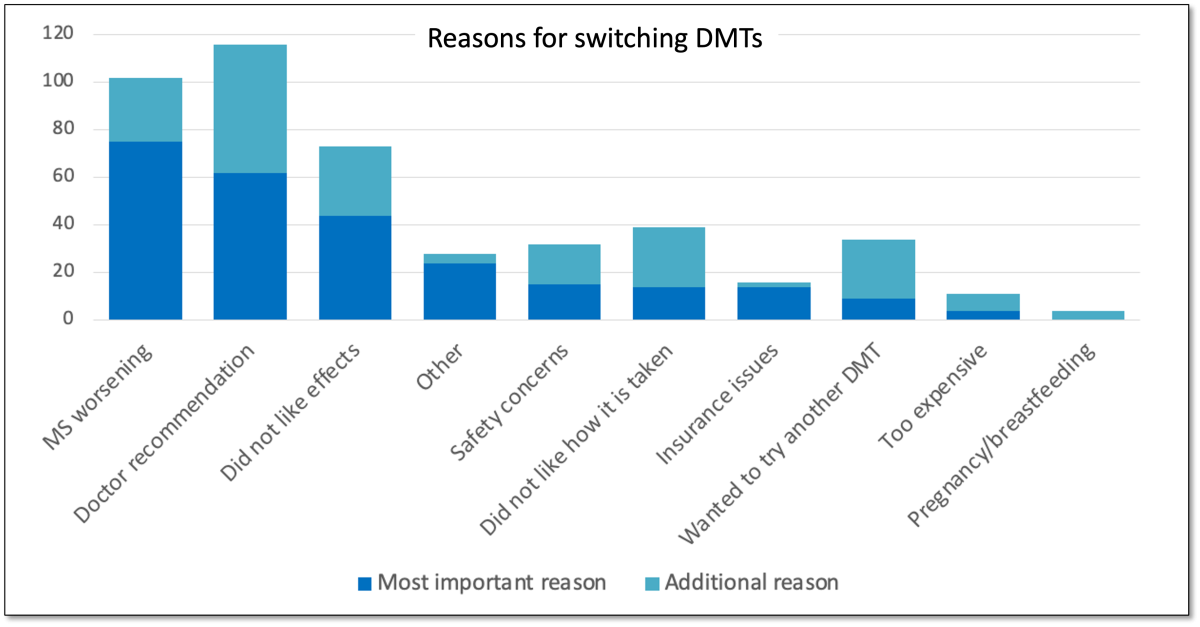
- Worsening MS, doctor recommendation, and side effects were the most common reasons cited for deciding to switch DMTs.
- When asked about the most important factor influencing their choice of DMT when switching, 69% of the participants selected DMT effectiveness. Safety, route of administration, and out-of-pocket costs were the next most commonly chosen factors.
- 82% had used a patient support program offered by a DMT manufacturer. Participants ranked payment assistance as the most helpful type of program.
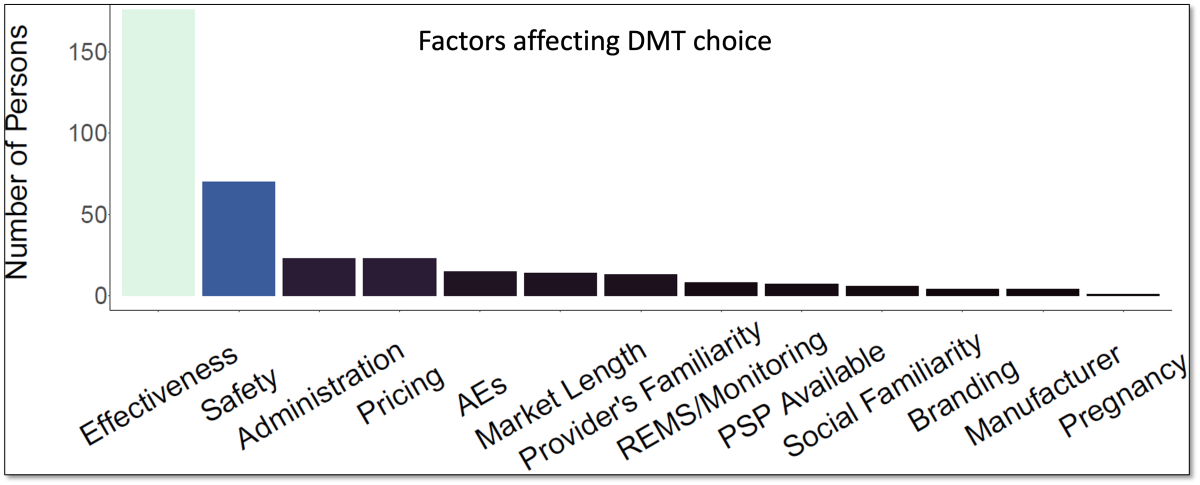
- Just over half (51%) of participants had heard the term "biologic," and 43% had heard the term "biosimilar." However, not everyone who had heard these terms were able to define them.
- Only 26% of respondents had ever used digital apps or tools for monitoring their MS. Lack of interest and awareness were the most common reasons for not using these products.
What do these study findings mean?
These findings help to shed light on the decision-making process regarding DMT switches, and the types of information and support that PwMS need to successfully manage this process. We found that manufacturer support programs are viewed as helpful, and that explanations of potentially unfamiliar terms may be needed as new types of DMTs become available.
What will we do next with this information?
These results have been shared as a poster presentation at the 2024 Consortium of MS Centers annual meeting.
Learn more
Poster: Results shared at the 2024 CMSC annual meeting
Share this project summary with others:
https://www.iconquerms.org/experiences-ms-treatments-and-support-programs
- Most participants (86%) were currently using a DMT, and 71% had switched DMTs at some point.
-
Topic:Disease Modifying TherapiesStatus:Results Available
Comparing Stopping or Continuing Use of Disease Modifying Therapies in Older Adults with Multiple Sclerosis: The DISCOMS Trial
Research in Multiple Sclerosis (MS) suggests that risk of relapses and new Magnetic Resonance Imaging (MRI) changes diminish significantly as people age, especially in MS patients 55 or older. Thus, the need to continue MS medicines that reduce relapses and new MRI lesions may also decrease as people age, especially in those who have not had relapses or MRI scan changes for prolonged times. This study plans to learn more about the safety of stopping MS medication in this population, as compared to continuing on the medication.Summary of Research Study
Older MS patients typically experience fewer relapses compared to younger patients. Research suggests this may, in part, be due to the immune system weakening with age, a process known as immunosenescence. This natural decline can make older patients more susceptible to adverse events from some DMTs, including infections. Additionally, other medical conditions, such as heart disease, diabetes, and cancer, are more prevalent later in life and may increase the risk of DMT side effects, changing the risk-benefit profile of medications they may either be currently taking, or considering for their MS. Therefore, it is crucial to explore whether older patients can safely stop taking DMTs without increasing their risk of relapses or new brain lesions. The results were inconclusive and the researchers were unable to say whether patients who stopped DMTs did as well as those who continued. An extension study to gather more information is ongoing.
Who Did the Research?
This study was led by the University of Colorado and included participants from multiple study sites. The principle investigator was Dr. John Corboy, and the study was funded by PCORI and received additional support from the National Multiple Sclerosis Society and EMD Serono.
Who Was in the Study?
The study included 259 MS patients aged 55 and older who were taking DMTs. These patients had not experienced a relapse for at least five years or new brain lesions for at least three years. The average age of participants was 63, with 83% being women. Most participants were White (89%), followed by Black (9%) and other races (1%); 1% were Hispanic. All participants received care at one of 19 health systems in the United States.
Study Process
The research team conducted a study to determine if older patients who stopped taking DMTs had a higher risk of new relapses or new brain lesions compared to those who continued taking the medication. They also assessed whether stopping DMTs affected patients' level of disability.Participants were randomly assigned to either stop or continue taking their DMTs. They underwent MRI scans at the start of the study and at 6, 12, and 24 months to check for new or changing brain lesions. Additionally, participants had regular doctor visits and completed surveys about their symptoms every six months.
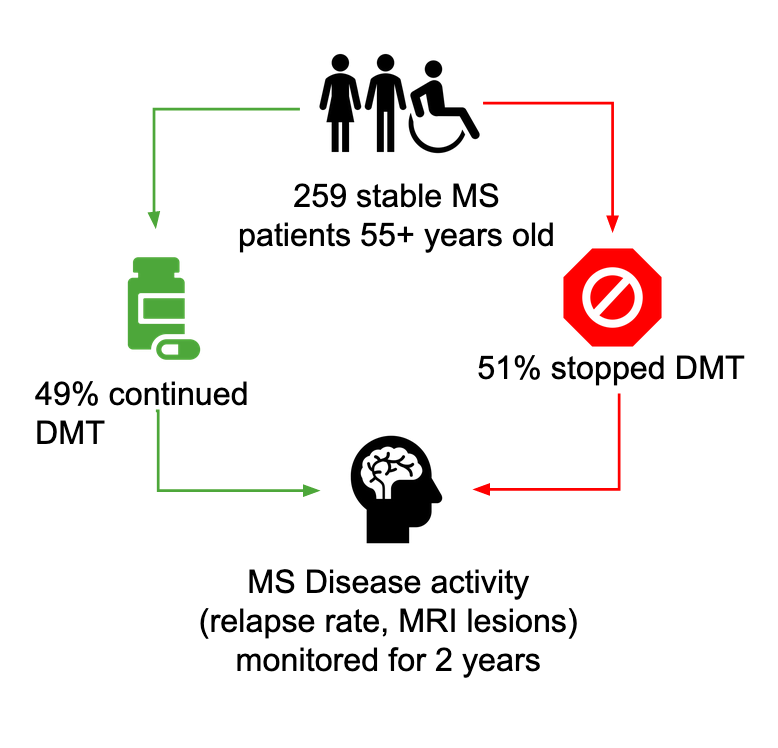
What Were the Results?
After two years, 5% of patients who continued taking DMTs had a relapse or new brain lesion, compared to 12% of those who stopped taking DMTs. The researchers were unable to say that stopping DMTs wasn’t worse than continuing DMTs in this group of patients. However, there was no significant difference in changes in the level of disability between the two groups.
Limitations of the Study
The study only included older patients with no recent relapses or brain lesions and a moderate ability to function. Therefore, results may differ for other groups of patients. About one-third of participants did not complete the full two-year study, which may have influenced the results.
Future Research
An extension study looking at results over 5 years is ongoing. These results are expected to help the researchers better understand the impact of discontinuing DMTs.
Technical Summary: Detailed Research Methods and Findings
Research Methods
Participants were randomly assigned to either stop or continue their DMTs. They underwent MRI scans at baseline and at 6, 12, and 24 months to detect new or expanding lesions. Participants also had regular clinical assessments and completed symptom surveys every six months. Input from MS patients, clinicians, patient advocates, and pharmaceutical company representatives was integrated throughout the study to ensure a comprehensive approach.
The study included a statistical non-inferiority test to determine whether discontinuing DMTs was not unacceptably worse than continuing DMTs. Researchers defined non-inferiority as a maximum difference of 8% in any relapse or new or expanding brain lesions on MRI in discontinuers compared to continuers. Specifically, researchers expected relapses or new or expanding brain lesions on MRI to occur in 2% of the continuer group and accepted a maximum of 10%, or a relative risk of 5.0, in the discontinuer group to be non-inferior.
Key Findings
The study's primary outcome measure was the presence of relapses or new brain lesions. At a mean follow-up of 22 months, 4.7% of patients who continued taking DMTs reported relapses or new brain lesions on MRI, compared with 12.2% of patients who discontinued DMTs. With a non-inferiority margin of 8%, the study was unable to demonstrate that discontinuing DMTs was non-inferior to continuing DMTs (difference in proportions of 7.5%; 95% confidence interval: 0.6%, 15.0%; p=0.521).The two groups did not differ significantly in confirmed disability progression.
Conclusion
These results fell into the non-inferiority margin “gray zone” and the researchers were unable to conclude that discontinuing DMTs is non-inferior to continuing. People who stop their DMT may have a slightly increased risk for MRI lesions and/or relapses.
Learn more about the implications of this research
Podcast
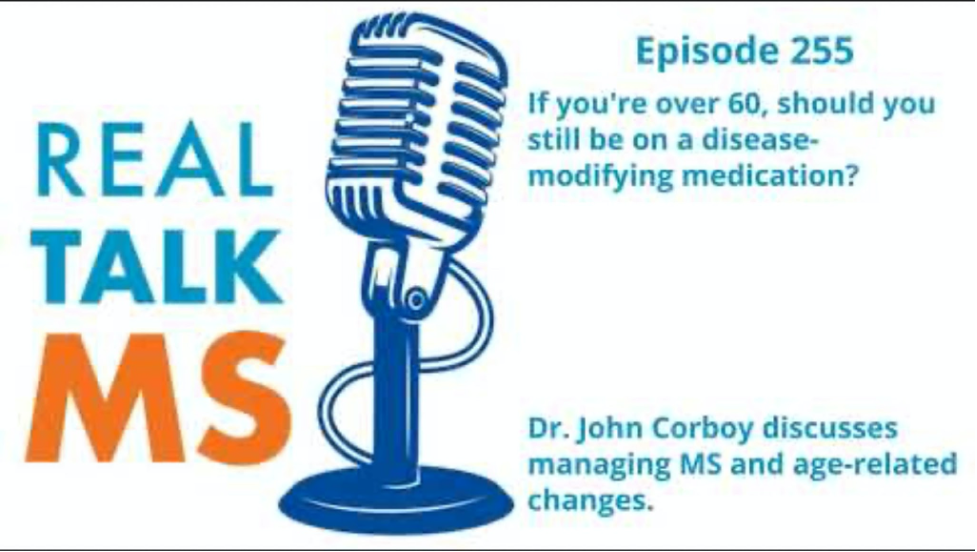
Excerpt from a RealTalkMS podcast interview with the study team. To listen the the full podcast click here.
Peer Reviewed Publications
"Risk of New Disease Activity in Patients with Multiple Sclerosis who Continue or Discontinue Disease-Modifying Therapies (DISCOMS): A Multicentre Randomised, Single-Line, Phase 4, Non-Inferiority Trial (2023)." The Lancet Neurology
"Perspectives of Patients with Multiple Sclerosis on the Discontinuation of Disease Modifying Therapies" Multiple Sclerosis Journal (not open access)
Other Media
Written interview with John Corboy for InfoMS. https://mscenter.org/article/results-of-the-disco-ms-study/
Video interview with John Corboy for MedPage Today. https://www.medpagetoday.com/meetingcoverage/cmscvideopearls/99574
Discussion with Dr. Robert Fox for Neurology Live.https://www.medpagetoday.com/meetingcoverage/cmscvideopearls/99574
Webinar
Webinar hosted by the study team from Rocky Mountain MS Center hereTopic:Quality of LifeStatus:Results AvailableDiagnosis experiences and their impact on health and well-being in MS
In this study, iConquerMS members completed a survey asking about their experience of receiving an MS diagnosis, as well as how they share their diagnosis with others.What are the goals of the study?
People with MS often struggle with whether and how to tell others that they have MS. There are many factors that could affect how people approach this decision. For example, previous research found that people who are more concerned about telling others about their MS tend to be lonelier and have less social support. It’s possible that the quality of MS healthcare may also affect whether a person with MS reveals their diagnosis to others.
The goals of this study were:
- To find out how many people with MS hide or share their diagnosis.
- To research whether a person's experience when they were first told they had MS has anything to do with how they share or hide their diagnosis later on.
- To check if a person's doctor talking with them about sharing their diagnosis changes how they share or hide it.
Who led the study and what was the funding source?
The study was led by Drs. Victoria Leavitt and Andrew Solomon, and funding was provided by the University of Vermont Multiple Sclerosis Center.
How was the study conducted?
- Researchers invited adults who had been diagnosed with MS who are members of iConquerMS to take a survey.
- The survey asked people about their diagnosis experience, whether they hide or share their diagnosis, and whether their doctor talks to them about sharing their diagnosis.
- A total of 428 adults with MS participated in the study by completing the survey.
- Researchers looked at the answers to the survey questions to see if there were any patterns.
What did we learn from this study?
- Almost half of people with MS who answered the survey said that they sometimes, often, or always hide their diagnosis from others.
- Younger people with MS are more likely to hide their diagnosis, as are people with higher education levels or who were less disabled.
- People with MS who had a negative experience when they were diagnosed are more likely to hide their diagnosis later on.
- Doctors rarely talk to people with MS about sharing their diagnosis. Only 23% of the people surveyed said that a healthcare provider has ever brought this topic up.
- People with MS who have talked to their doctor about sharing their diagnosis are less likely to worry about the negative consequences of sharing their diagnosis.
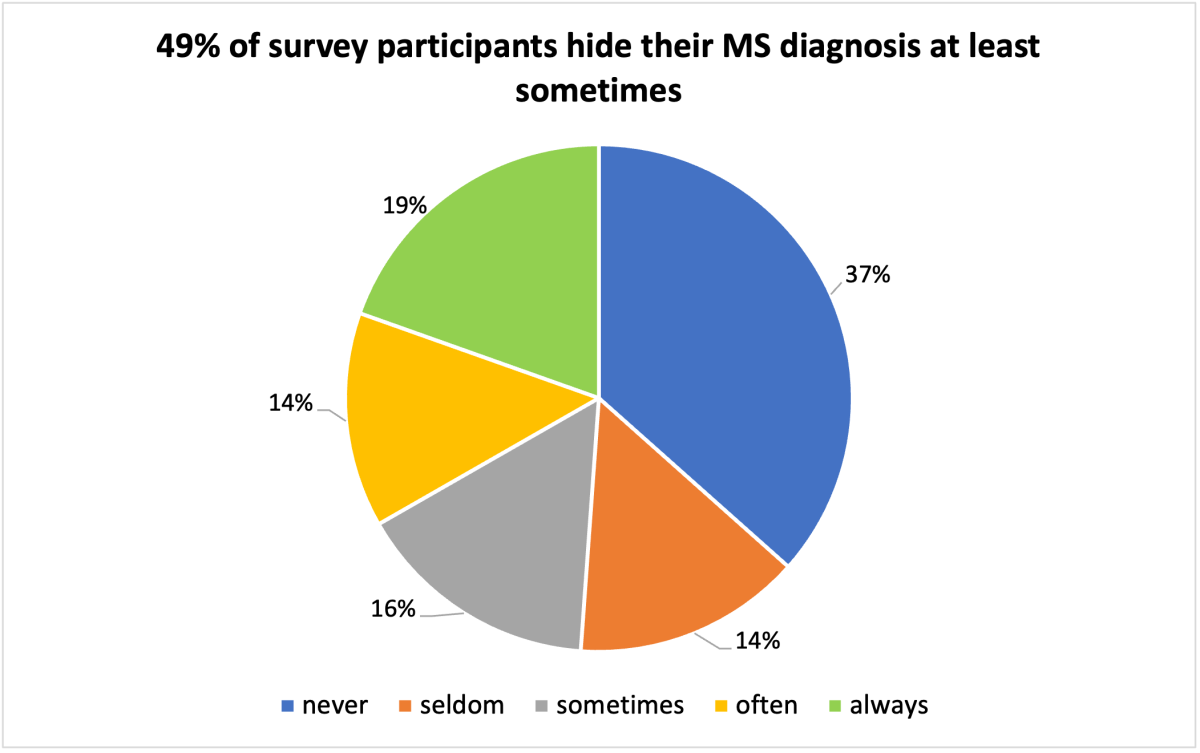
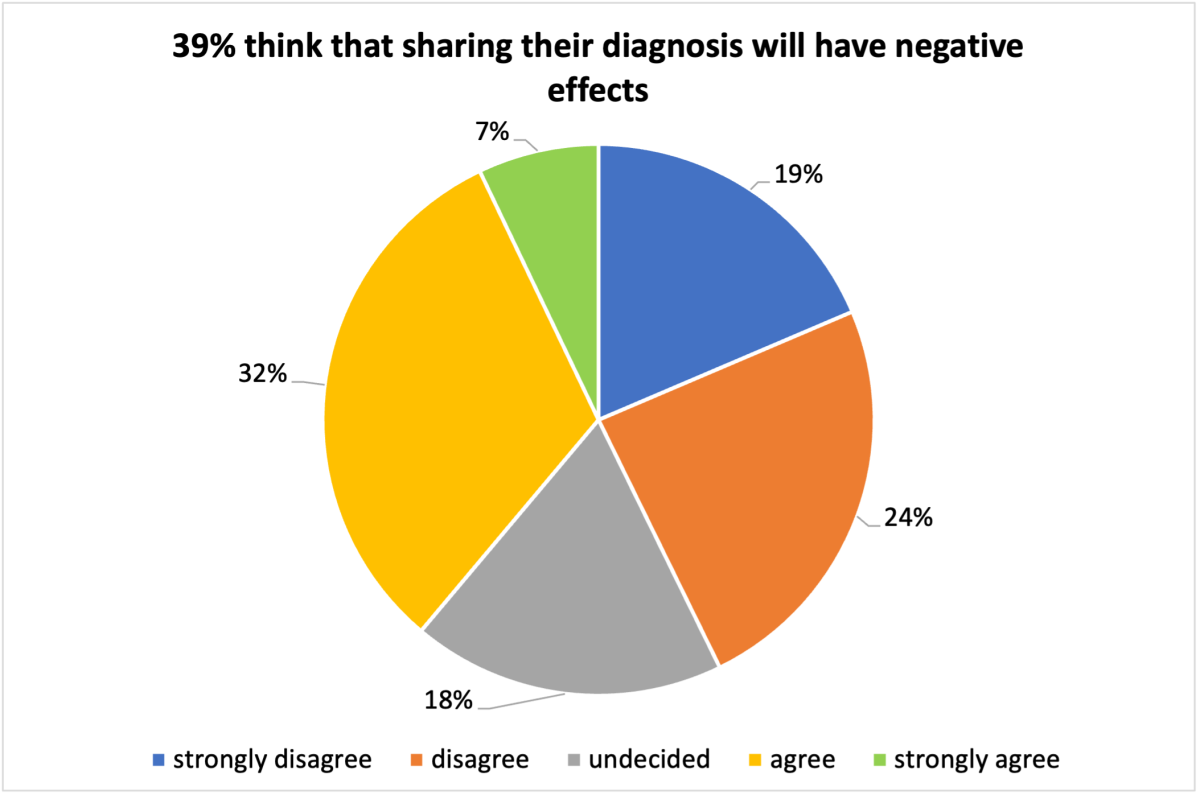
What do these study findings mean?
- If you are younger and you have recently been diagnosed with MS, you may be more likely to hide your diagnosis. It is important to know that you are not alone, and there are resources available to help you.
- If you had a negative experience when you were diagnosed with MS, you may also be more likely to hide your diagnosis later on.
- Many doctors do not talk to their patients with MS about sharing their diagnosis. However, talking to your doctor about sharing your diagnosis can help you to feel more confident about your decision.
- If you are worried about the negative consequences of sharing your diagnosis, there are things you can do to protect yourself. For example, you can talk to your employer about your rights under the Americans with Disabilities Act (ADA), and you can join a support group for people with MS.
What will we do next with this information?
- These findings suggest that it’s beneficial for people with MS to talk with their doctors about whether or not to share their diagnosis with others.
- One key priority of this research is to make MS healthcare providers aware of the importance of discussing with their patients whether and when to share a diagnosis.
- Another priority is to make people with MS aware that the burden of sharing and hiding is a health issue, not just another problem they need to figure out on their own.
- The research team is continuing to analyze the results of the survey. This includes exploring whether hiding an MS diagnosis might affect the health and well-being of people with MS.
Learn more:
Journal article: Diagnosis concealment is prevalent in MS, and associated with diagnosis experience
Journal article: Diagnostic delay and misdiagnosis of symptoms reported by patients with multiple sclerosis participating in a research registry
Journal article: Diagnosis concealment behaviors and disclosure beliefs are associated with health and quality of life in people with multiple sclerosis
Share this project summary with others:
https://www.iconquerms.org/diagnosis-experiences-and-their-impact-health-and-well-being-ms
Topic:HealthcareStatus:Results AvailableHealthcare experiences and disparities in multiple sclerosis
iConquerMS members completed a survey about their healthcare experiences, including the diagnostic process, treatment decisions, discussions about research, and any discrimination experienced in healthcare settings. The results were analyzed by racial and ethnic group, and the findings were incorporated in an online educational program for medical professionals.What were the goals of this study?
The goal of this study was to learn about the healthcare experiences of people with MS from diverse backgrounds, and incorporate those experiences into an online educational program for medical professionals.
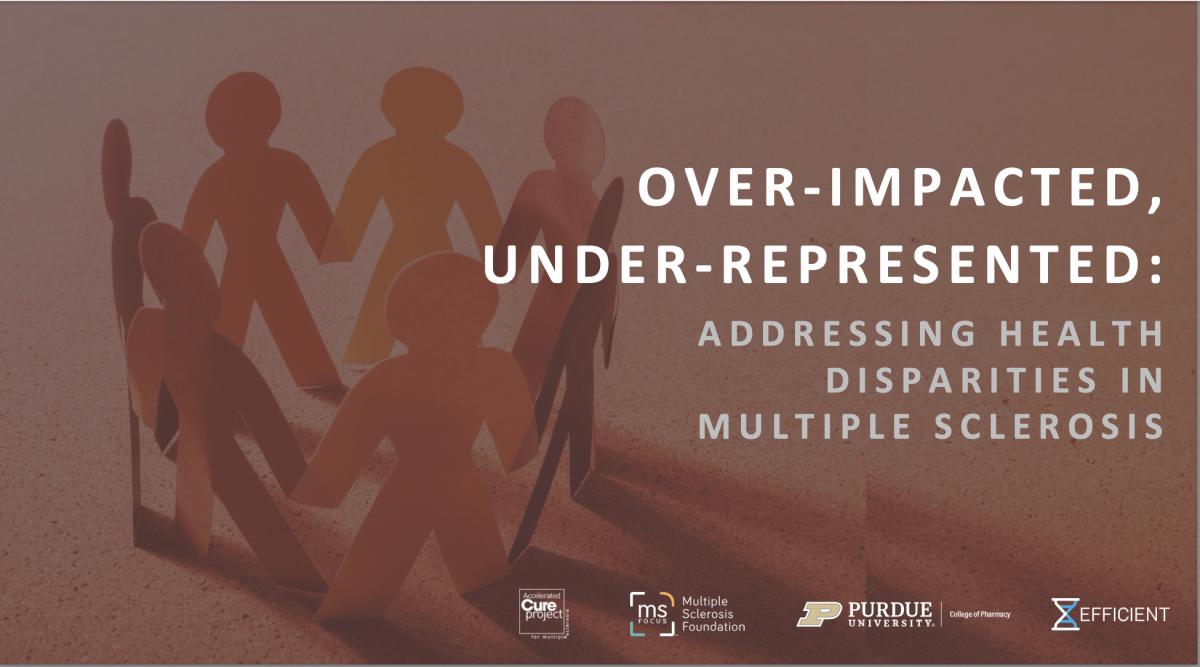
MS was once believed to be a "White person's disease," but we now know that it affects people of all races and ethnicities. We also know that the quality of MS healthcare a person receives can vary across populations due to factors such as discrimination and lack of availability of services.
Healthcare providers such as neurologists and MS nurses can play an important role in ensuring that all people with MS receive high-quality healthcare in their own practices and beyond. They can be more effective partners if they have a sound understanding of how MS affects people from diverse backgrounds and how bias in the healthcare system can impact health and well-being. The program created with this study was designed to deliver this information to healthcare providers in a convenient format that resonates with them.
Who led the study and what was the funding source?
The study was led by Brian Moss, CEO of Efficient CME, a company that produces medical education programs. The instructors for the program were Drs. Mitzi Williams, Annette Okai, and Stephen Krieger. EMD Serono and Janssen Pharmaceuticals, Inc. provided support in the form of educational grants.
How was the study conducted?
The study team developed a survey for iConquerMS members which incorporated input from the iConquerMS Equity, Diversity and Inclusion Committee and iConquerMS Research Committee.
The survey covered topics such as:
- Early symptoms and the diagnosis of MS
- Decisions and discussions around taking an MS medication
- Trust in and comfort with MS healthcare providers
- Experiences with discrimination when seeking MS healthcare
- Perspectives about participating in clinical research
We sent survey invitations to iConquerMS members who had previously reported being part of a racial or ethnic minority group. Invitations were also sent to White non-Hispanic iConquerMS members as a comparison group. The MS Foundation helped with recruitment by sending invitations to people who had participated in a recent Black History Month event. The survey was open during March and April 2022.
What did we learn from this study?
In all, 142 people participated in this study, including 94 (66%) people from a minority background and 48 (34%) who were White and non-Hispanic. The results highlighted a number of areas where MS healthcare experiences appear to differ based on participants’ background.
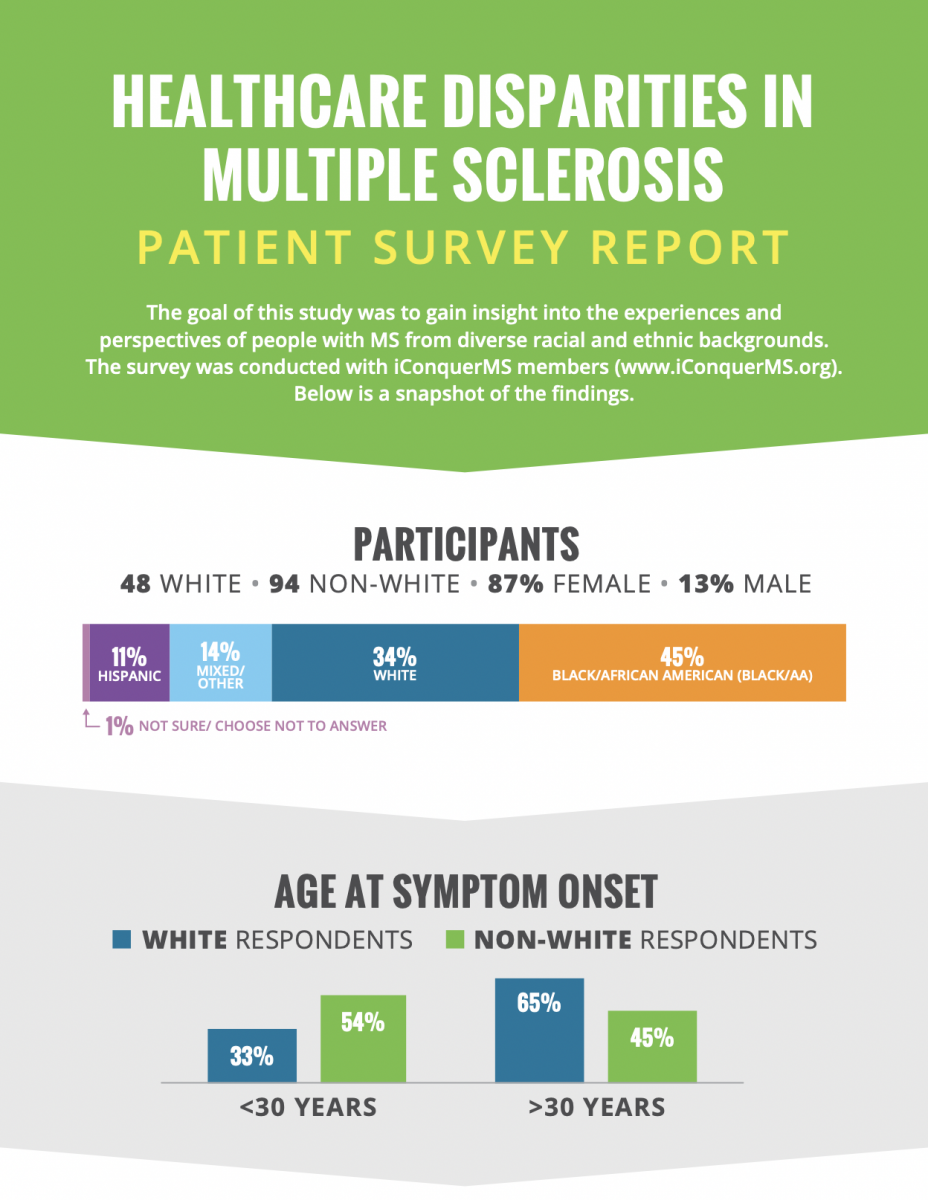
Early symptoms and diagnosis:
- Minority group members taking the survey tended to wait longer to receive an initial diagnosis of MS, despite often experiencing symptoms earlier.
- For instance, 35% of minority participants waited for 3 years or longer for their diagnosis compared with 25% of non-Hispanic White participants.
- Minority group members were also slightly more likely to be misdiagnosed with another condition before receiving their MS diagnosis.
Experiences with healthcare providers:
- Only 17% of minority group members said that their MS healthcare provider was of the same race or ethnicity, compared with 69% of non-Hispanic White participants.
- Approximately one out of four Black and mixed-race patients said they had changed healthcare providers due to being treated unfairly.
- Examples included:
- Not being listened to
- Not being taken seriously
- Being talked down to
- Having negative assumptions made about them
- 73% of minority group members said that their healthcare provider had never discussed how their racial/ethnic background might influence their MS.
Research participation:
- 77% of Black participants were interested in participating in an MS therapy clinical trial, along with 65% of non-Hispanic White participants, 47% of Hispanic participants, and 48% of participants from another minority race.
- Top reasons for being interested in clinical trials included:
- Access to new treatments
- Helping others with MS
- Helping others with similar racial or ethnic backgrounds (for minority group members)
- Top reasons stated by those who weren’t interested in participating in a clinical trial included:
- Safety risks
- Not wanting to be an experiment
- Concerns about receiving a placebo (dummy) treatment
- Nearly all patients who participated in research, regardless of background, were satisfied with their experience.
What do these study findings mean?
Despite greater awareness that MS can affect people of all backgrounds, this survey found that minority group members had a longer path to diagnosis, despite often experiencing symptoms earlier. The results also show that most people with MS belonging to minority groups see an MS healthcare provider from a different background, and were more likely to have experienced discrimination from a healthcare provider at some point during their care.
What will we do next with this information?
The educational program is online and available for healthcare providers to take. The study team is also planning to present the survey results at an upcoming MS medical and research conference to increase awareness of these important findings.
We will also review these results with the iConquerMS Equity, Diversity and Inclusion Committee, and with the iConquerMS Research, Inclusion, Diversity and Equity (RIDE) Council, to discuss how iConquerMS can contribute to further awareness and progress toward MS healthcare equity.
Learn more
Infographic: Healthcare Disparities in Multiple Sclerosis
Video: Over-Impacted, Under-Represented: Addressing Health Disparities in Multiple Sclerosis (certified medical education program)
Topic:Healthcare, Wellness & DietStatus:Results Under AnalysisUse of complementary and alternative medicine by people with MS
iConquerMS members were surveyed about their use of and experience with complementary and alternative medicine (CAM), both before and during the COVID-19 pandemic.What are the goals of the study?

Many people with MS use complementary and alternative medicine (CAM) for their MS and/or for other health reasons. CAM includes practices or products that are not typically included in standard or conventional healthcare, such as acupuncture, meditation, or herbal therapies.
However, researchers and policymakers don't know how many people with MS are using CAM and which types of CAM they're using. Other unanswered questions include whether people with MS are integrating their CAM practices and services with their usual healthcare, how much they're paying for CAM including any insurance coverage, their reasons for using CAM, and perceived benefit of CAM.
The goal of this study was to learn more about these topics so that the National MS Society could better advocate for access and insurance coverage of CAM on behalf of people with MS.
Who led the study and what was the funding source?
The study was conducted by Gryphon Scientific and colleagues at the Accelerated Cure Project and the Veterans Health Administration. Funding was provided by the National MS Society.
How was the study conducted?
In September 2021, iConquerMS members were invited to fill out a survey asking about their use of CAM services, products and practices. Because the COVID-19 pandemic may have affected people's ability to access certain forms of CAM, we asked people to provide information about calendar years 2019 and 2020.
Topics covered in the survey included:
- Types of CAM services, products and practices used
- Out of pocket costs and insurance coverage for CAM
- Whether the person discussed their use of CAM with their conventional healthcare providers or not
- Whether the person felt that the type of CAM they used was helpful
The researchers also conducted interviews with a subset of the survey participants to learn more about their experiences with CAM. Another part of the study included analyses of large national health databases with information about CAM.
What is the study status?
The results have been analyzed and a report is in development.
Learn more:
Video: "Chat with Chat" interview with Dr. Sarah Minden
Share this project summary with others:
https://www.iconquerms.org/use-complementary-and-alternative-medicine-people-ms
Topic:COVID-19, Disease Modifying Therapies, HealthcareStatus:Open for Participation, Results AvailableSafety and effectiveness of COVID-19 vaccines in people with MS
iConquerMS is gathering important information about the COVID-19 vaccines and how they work in people affected by MS. The COVER-MS (COVID-19 Vaccine Response in MS) Study has been active since March 2021 and published its first set of results in November 2021. We are now collecting blood samples from COVER-MS participants to analyze the immune response to the vaccine.What are the goals of this study?
- To learn about the effects of the COVID-19 vaccines in people with MS, including how they work and what the side effects are
- To produce information that can help guide people with MS and their healthcare providers in making decisions related to COVID-19 vaccination
Who is leading the study and what was the funding source?
The study is being conducted by the iConquerMS research team in collaboration with Dr. Farren Briggs (Case Western Reserve University) and Dr. Farrah Mateen (Massachusetts General Hospital). A steering committee that includes people with MS is guiding and overseeing the study. The project is being funded by the National MS Society and Quest Diagnostics.
How is the study being conducted?
All iConquerMS members are eligible and welcome to participate. Currently there are over 1,500 participants. We ask participants to answer a few surveys on the iConquerMS portal at different timepoints asking about:
- Details of the vaccine that was received (e.g., date received and vaccine manufacturer)
- Short-term reactions to the vaccine (e.g., arm soreness)
- MS symptoms (type of symptom and severity) before and after receiving the vaccine
- COVID-19 infection (for anyone who becomes infected with COVID-19 after vaccination)
- Demographics (e.g., date of birth, race, ethnicity)
- MS characteristics (e.g., type of MS, MS therapies)
We are also inviting some COVER-MS participants to provide blood samples for a substudy. This substudy will analyze the immune responses (antibodies and T-cell activity) to the vaccines to learn how these responses are affected by MS drugs and other factors.
What are we learning from this study?
Our initial study findings have to do with reactions (side effects) to the vaccines. We have learned that:
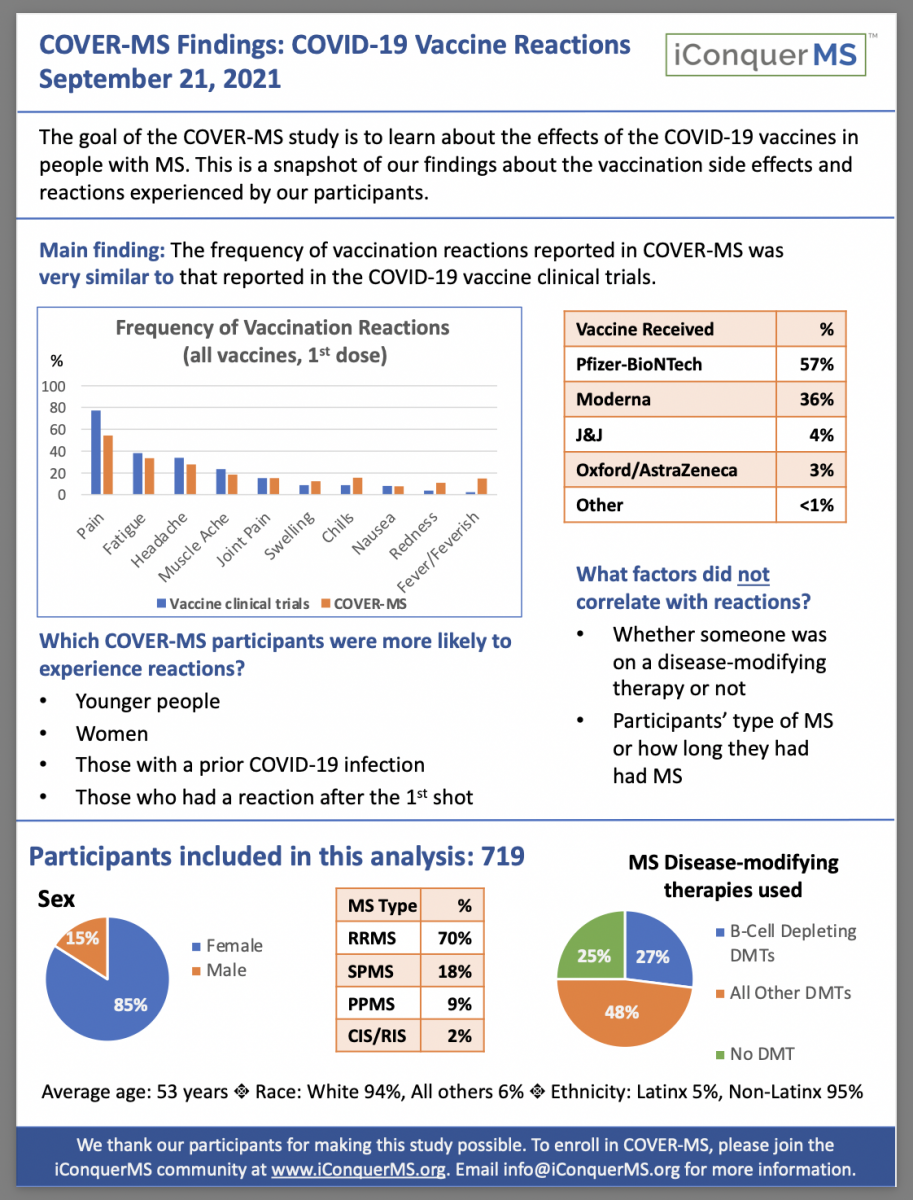
-
The frequency of vaccination reactions reported in COVER-MS was very similar to that reported in the COVID-19 vaccine clinical trials
-
Pain was the most commonly reported reaction, followed by fatigue and headache
-
Reactions were more common in younger people, women, those with a prior COVID-19 infection, and those who had a reaction after the first shot
-
Reactions were not affected by being on an MS drug, or type of MS, or how long someone has had MS
What do these study findings mean?
People with MS should not be concerned about having more serious reactions to the COVID-19 vaccinations compared to the general population.
What will we do next with this information?
The results of the study have been published in a variety of formats (see below) and have been shared with the National MS Society to inform their COVID-19 vaccination guidance for people with MS.
Learn more
Video: "Chat with Chat" interview with Dr. Farren Briggs
Infographic: COVER-MS Findings - COVID-19 Vaccine Reactions
Journal article (open-access): COVID-19 Vaccination Reactogenicity in Persons With Multiple Sclerosis
Journal article (open-access): Self-reported longitudinal COVID-19 vaccination reactogenicity profiles in persons with multiple sclerosis
Data: COVER-MS Data Dashboard
Poster: Details of the immune response substudy shared at the 2025 CMSC annual meeting
Share this project summary with others:
https://www.iconquerms.org/safety-and-effectiveness-covid-19-vaccines-people-ms
Topic:Wellness & Diet, Quality of LifeStatus:Results Under Analysis, Results AvailableWellness and diet, MS characteristics, and health outcomes
Data from the REAL MS Wellness & Diet survey are being analyzed by researchers at the University of Melbourne (Australia) to explore associations between lifestyle and health outcomes. Their initial findings focused on the impacts of wellness and dietary practices based on MS subtypes.What are the goals of this study?
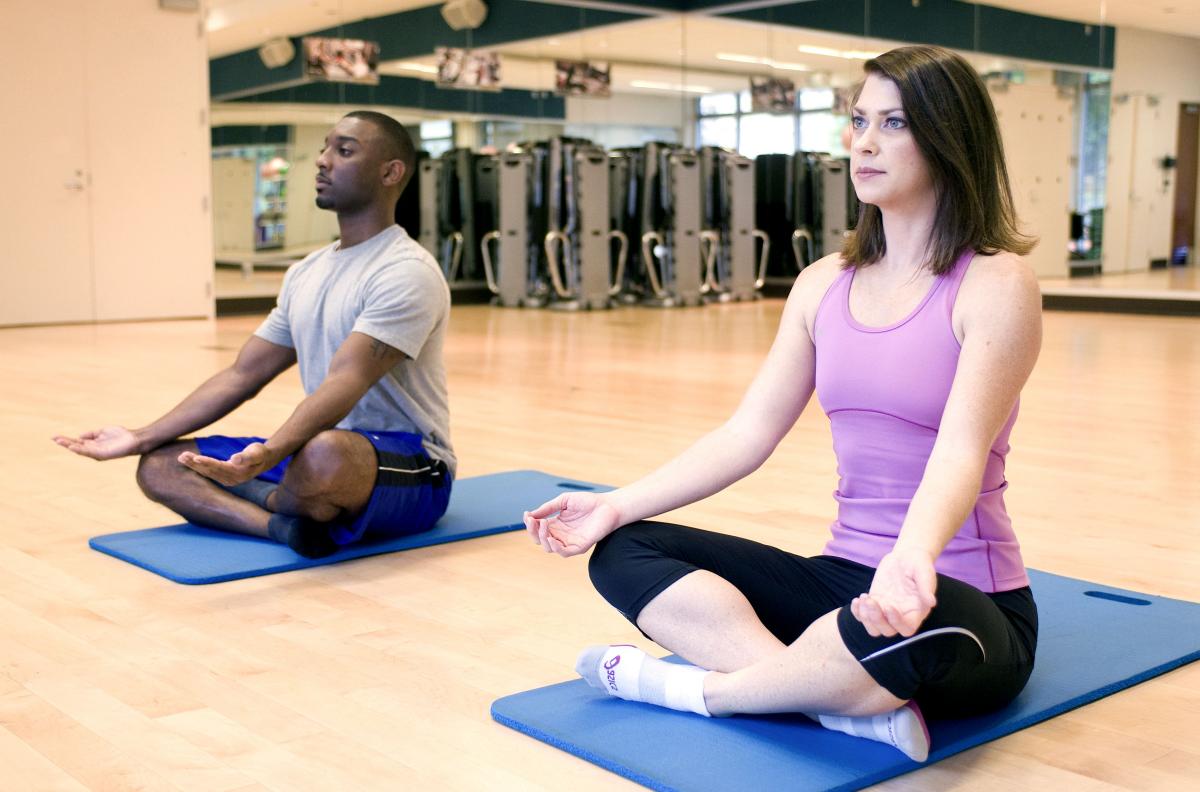
The overall goal of this study is to understand how health and well-being for people with MS are affected by various diet and wellness practices. The initial analysis focused on learning if there is a difference in benefits between people with progressive MS and people with relapsing-remitting MS.
Who led the study and what was the funding source?
The study is being led by Dr. Nupur Nag from the Neuroepidemiology Unit at the University of Melbourne. This research team has an ongoing project called Health Outcomes and Lifestyle In a Sample of people with Multiple Sclerosis (HOLISM) which studies connections between lifestyle practices and well-being in people with MS. Dr. Nag requested data from the REAL MS study to see if findings from the iConquerMS cohort would be similar to or different from the HOLISM findings.
The funding for this analysis was provided by the Neuroepidemiology Unit.
How was the study conducted?
The iConquerMS online community was invited to fill out twice-annual REAL MS surveys that includes questions on:
- Demographics (such as age, employment, and education)
- MS status
- Diet, vitamin and supplement usage
- Wellness practices
- Physical activity
- Quality of life factors including pain, fatigue, mobility, motor coordination, depression, cognition, social participation, and sleep.
Dr. Nag and her colleagues analyzed REAL MS data from 1,108 members to look for associations between lifestyle behaviors, type of MS, and health outcomes and quality of life (QoL).
What did we learn from this study?
Key study findings include:
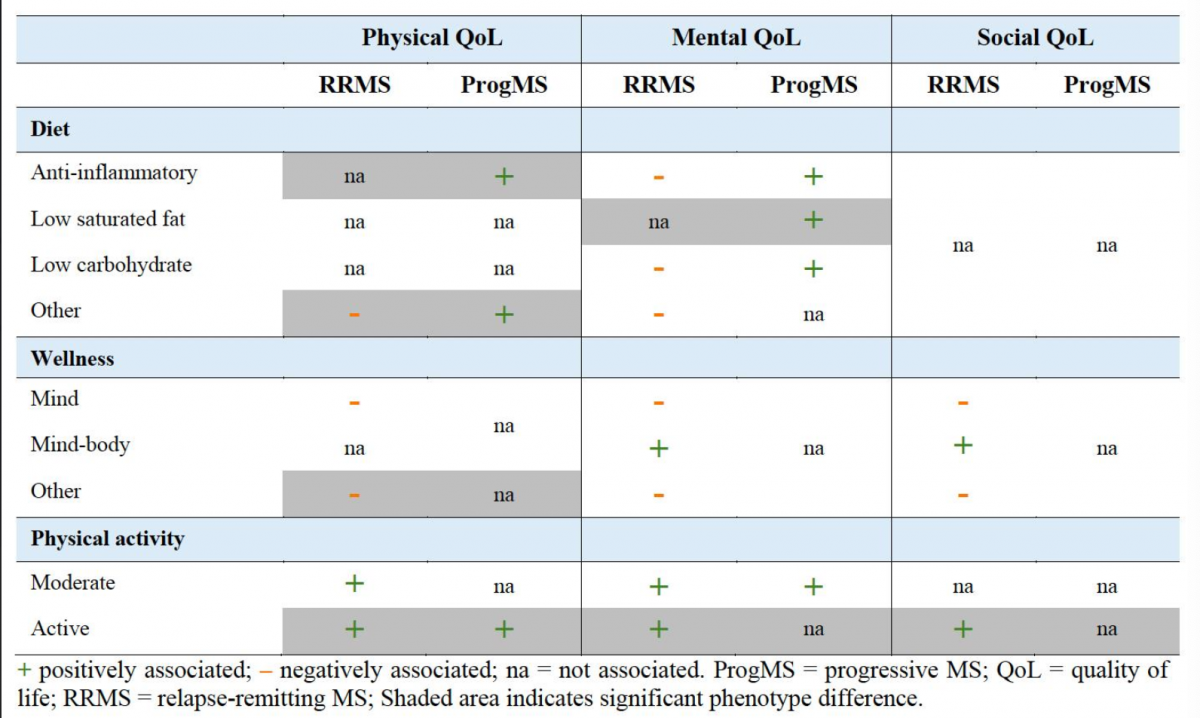
- Diet, wellness, and physical activity were associated with quality of life (QoL); no associations were seen for vitamin D or omega-3 supplement use
- Certain diet types were negatively associated with QoL in relapsing-remitting MS (RRMS), and positively associated in progressive MS
- Participation in wellness activities had mixed associations with QoL in RRMS but was not associated in progressive MS
- Physical activity was positively associated with QoL in RRMS and progressive MS
- Differences in associations between lifestyle practices and individual components of QoL (physical, mental and social) were seen for RRMS and progressive MS
What do these study findings mean?
Understanding how various health behaviors impact MS symptoms and quality of life in people with relapsing-remitting compared with progressive MS can help guide personalized management strategies that are specific to disease course. These results show lifestyle behaviors are associated with QoL, and these associations appear to differ based on type of MS (RRMS or progressive MS). Further research studies, using techniques that can better measure the impact of behaviors on health outcomes, are required to better inform MS management.
What will we do next with this information?
Dr. Nag and her colleagues will continue to analyze the REAL MS data further and expect to publish additional findings on the connection between wellness behaviors and health.
Learn more
Journal article (open-access): Associations between Lifestyle Behaviors and Quality of Life Differ Based on Multiple Sclerosis Phenotype
Video: "Chat with Chat" interview with Dr. Nupur Nag
Share this project summary with others:
https://www.iconquerms.org/wellness-and-diet-ms-characteristics-and-health-outcomes
Topic:HealthcareStatus:Results AvailableMRIs in MS: Access, knowledge, and interest among people with MS
iConquerMS partnered with the Belgium-based imaging company Icometrix to conduct a survey about the MRI-related knowledge, attitudes, information needs, and experiences of people with MS.What are the goals of this study?
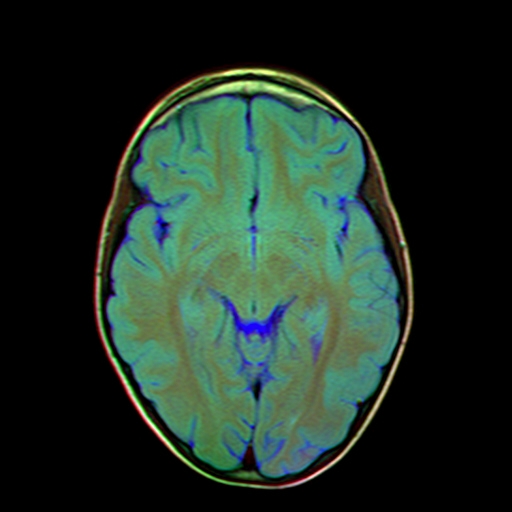
MRI is an important tool for monitoring and managing MS and can help show how the disease is progressing or how well an MS treatment is working. People with MS are encouraged to take an active role in their disease management, but may not know how to access their MRI images or understand what they mean.
Who led the study and what was the funding source?
The study was led by Lars Costers at Icometrix and Hollie Schmidt at iConquerMS with internal funding.
How was the study conducted?
We developed an online survey which iConquerMS members were invited to take. The survey covered topics such as frequency of MRI scans, interest in the information provided by MRIs, ability to access MRI images and view them, and attitudes toward sharing MRIs with researchers. In all, 876 people with MS took the survey.
What did we learn from this study?
Key study findings include:
- Only 55% of the people taking the survey have an MRI scan at least once a year
- 73% had requested or received an electronic copy of their MRI; 27% had never received one
- Of those who had looked at their images on their own, 13% understood them completely, 54% understood them somewhat, and 33% didn't understand them very much or at all
- Barriers to viewing images included not knowing how to view the images, not having the necessary software, and not knowing how to interpret them
- Almost all people taking the survey (95% or more)
- were interested in knowing about changes from one MRI to the next
- wanted to know if their MRI was performed according to current guidelines
- were willing to share their MRIs with researchers
What do these study findings mean?
These findings indicate that although some people with MS are able to view and understand their MRI images, most would need education and support to do so. There is strong interest in knowing what the MRIs show in terms of changes over time, and in whether guidelines are followed in performing the MRIs.
What will we do next with this information?
Icometrix is making use of these results as they develop tools for people with MS, including applications for viewing MRIs. You can learn more at their website: icometrix.com
Learn more
Video: "Chat with Chat" interview with Annabel Descamps
Presentation: Results shared at the 2021 ACTRIMS conference
Share this project summary with others:
https://www.iconquerms.org/mris-ms-access-knowledge-and-interest-among-people-ms
Topic:Quality of LifeStatus:Results Under AnalysisTailoring employment supports for people living with MS
In this study, iConquerMS members will be surveyed about their employment experiences, including their use of resources aimed at enabling them to remain employed. The results will be used to predict whether a person will need specific sources of support to stay in the workforce, and to develop a system for providing tailored, just-in-time information and resources to people based on their individual needs and characteristics.What are the goals of this study?
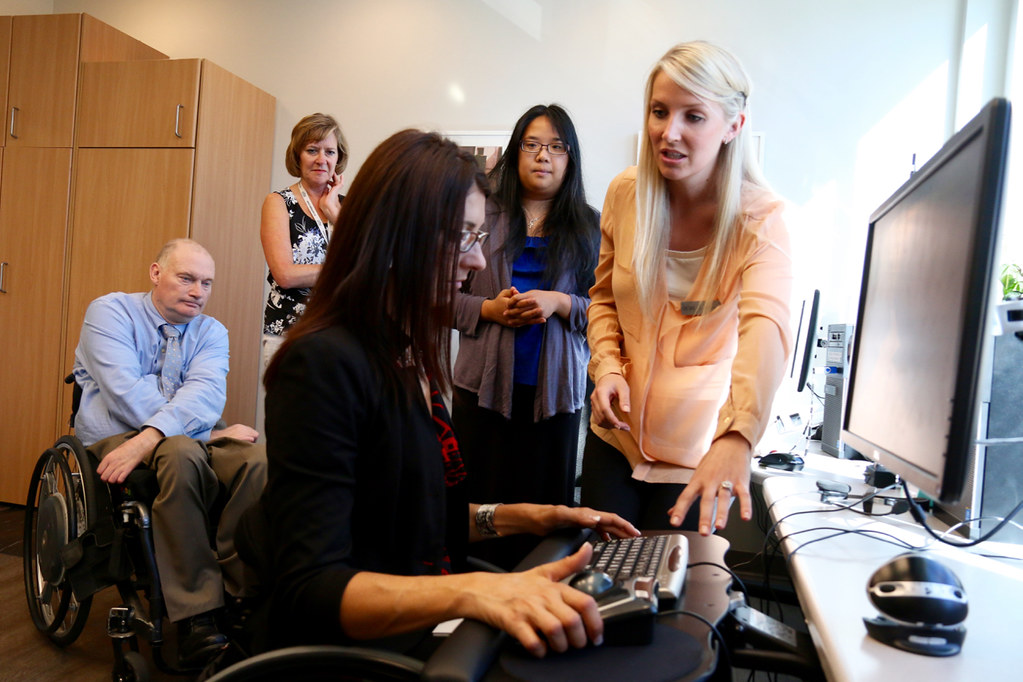 The rate of employment among working-aged adults with MS is consistently well below that of the general population. For a variety of reasons, adults with MS frequently leave employment before it is necessary, often without knowing about resources that may enable them to remain employed. The goal of the study is to learn more about the factors that influence whether a person with MS remains employed, so that personalized assistance can be provided that helps people with MS stay in the workforce.
The rate of employment among working-aged adults with MS is consistently well below that of the general population. For a variety of reasons, adults with MS frequently leave employment before it is necessary, often without knowing about resources that may enable them to remain employed. The goal of the study is to learn more about the factors that influence whether a person with MS remains employed, so that personalized assistance can be provided that helps people with MS stay in the workforce. Who is leading the study and what is the funding source?
The study's principal investigator is Dr. Malachy Bishop of the University of Wisconsin-Madison. The study funder is the University of Wisconsin-Madison.
How will the study be conducted?
All iConquerMS members who are currently employed or who have been employed within the past 5 years are eligible to participate in this study. We are asking interested participants to answer a survey on the iConquerMS portal. The surveys ask about topics such as:
- Current employment situation
- Impact of specific MS symptoms on ability to work
- Workplace accessibility
- Disclosure of MS status in the workplace
- Perceived employer and co-worker stigma and discrimination
- Communication about and use of on-the-job accommodations
- Understanding of various employment-related resources, services and benefits
What is the study status?
The survey data is currently being analyzed by the research team. We will share the results as soon as they are available.
Share this project summary with others:
https://www.iconquerms.org/tailoring-employment-supports-people-living-ms
Topic:HealthcareStatus:Results AvailableUse of and attitudes toward telemedicine in MS
iConquerMS members were surveyed about their use of and experience with telemedicine (healthcare delivered over the phone or Internet), both before and during the COVID-19 pandemic. The results of this study are being used by the National Multiple Sclerosis Society to advocate for access to telemedicine for people with MS.What are the goals of this study?

This study was conducted to learn about how people with MS are using telemedicine for different types of services, and what their experience has been like. Another goal was to learn about how people feel about telemedicine in terms of its benefits and its drawbacks. This study was done in the context of the COVID-19 pandemic, which forced many healthcare services to switch to telemedicine. The researchers surveyed people with MS before the pandemic started and again during the pandemic to compare their telemedicine use.
Who led the study and what was the funding source?
The study was led by Mitchell Wallin, MD, at the VA Medical Center-MS Center of Excellence (www.va.gov/ms) in Washington, DC, and Louise Sumner at Deloitte Consulting. The study funder is the National Multiple Sclerosis Society.
How was the study conducted?
This study surveyed people with MS about their experiences with telemedicine before and during the COVID-19 pandemic. A subset of iConquerMS members were also interviewed to learn about their experiences in more detail.
Recruitment: All iConquerMS members were invited to take part in the telemedicine survey. The first survey was sent out in January 2020 (before the pandemic) and the second survey was sent out in September 2020 (during the pandemic).
Survey design: Both surveys asked about participants' demographics (age, location, etc.), MS characteristics, use of in-person and telemedicine healthcare services, technology access, and opinions about telemedicine. The second survey also included a few new questions that were relevant to the pandemic.
Data analysis: Researchers compared the pre-pandemic results to the during-pandemic results to see how telemedicine use changed. Some participants completed both surveys, so the researchers were also able to look for any changes within the same individuals.
What did we learn from the study?
This study highlighted how the COVID-19 pandemic significantly impacted the use of telemedicine by people with MS:
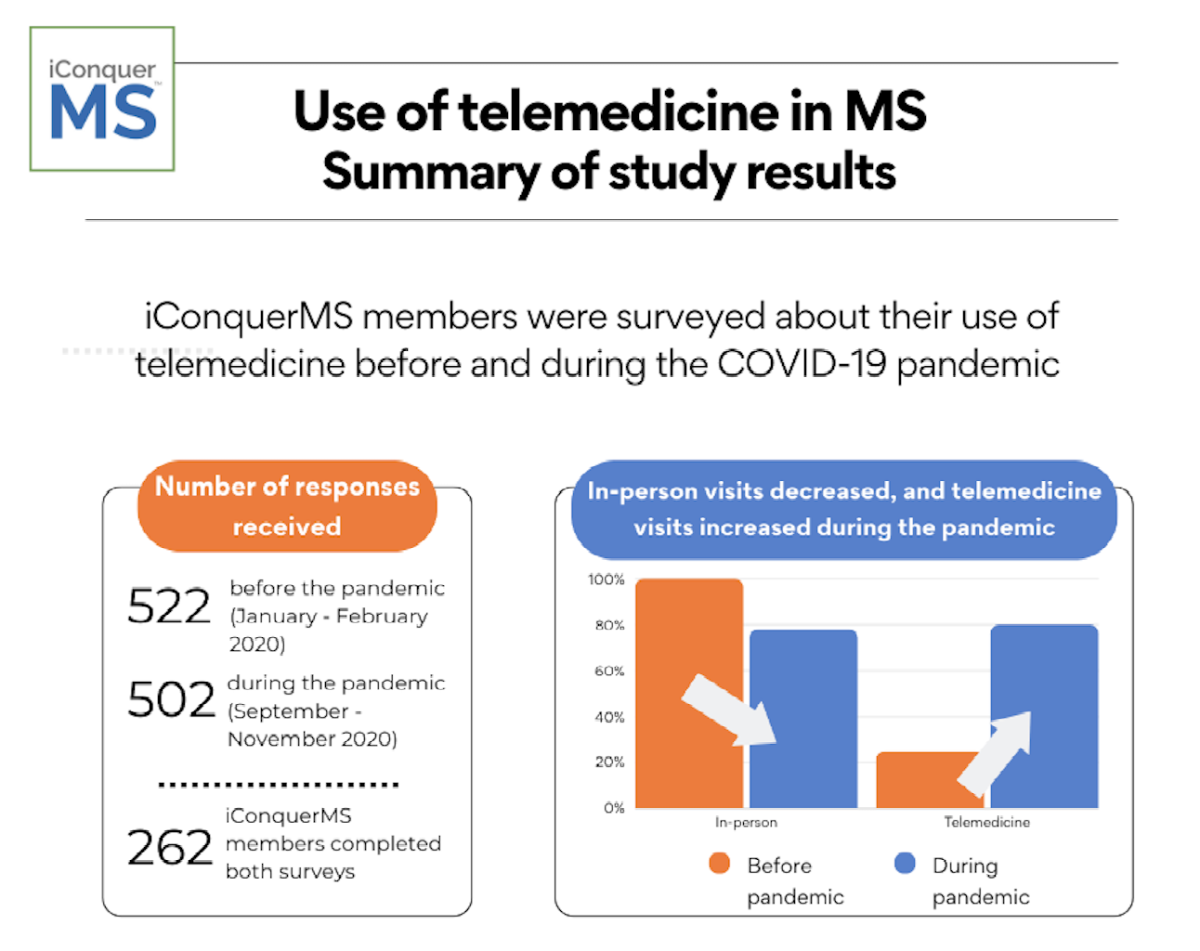
- Telemedicine use surged during the pandemic. Before the pandemic, only about 25% of participants had used telemedicine in the past year. However, this number jumped to roughly 80% during the pandemic. At the same time, almost 100% of participants had had an in-person healthcare visit before the pandemic, but this declined to about 78% during the pandemic.
- The shift to telemedicine was largely driven by the pandemic. Before the pandemic, many people chose telemedicine to save travel time and to access specialists and services not available in their local area. However, during the pandemic, the primary motivator was protection from COVID-19 exposure.
- Most participants had the technology needed for telemedicine. Both before and during the pandemic, the vast majority of participants had access to smartphones, computers, tablets, and/or webcams indicating they were equipped for virtual visits.
- People with MS are generally open to using telemedicine. Even before the pandemic, a significant number of participants (84%) were open to using telemedicine for at least some of their healthcare needs. This willingness persisted during the pandemic.
- There are limitations to telemedicine. The most frequently mentioned drawback was the difficulty of getting a full medical exam remotely. This suggests that while telemedicine is a valuable tool, it cannot completely replace in-person visits.
- The type of care received via telemedicine shifted during the pandemic. While primary care was the most frequent type of healthcare received via telemedicine before the pandemic, the focus shifted to general MS care and mental health services during the pandemic.
- Insurance coverage for telemedicine improved during the pandemic. The study found an increase in the proportion of participants whose telemedicine visits were fully or partially covered by insurance during the pandemic.
- People with MS value the telemedicine experience. Most of the participants who had had a recent telemedicine visit were satisfied with it, and indicated that they would like to continue using telemedicine.
What do these study findings mean?
The findings from this study suggest that telemedicine has the potential to make a real difference in the lives of people with MS:
- Increased access to care: Telemedicine can help bridge the gap in access to specialists, especially for those who live far from MS centers or have mobility issues that make travel difficult. This is particularly important for people with MS, who often require care from a variety of specialists.
- Greater convenience and flexibility: Telemedicine offers convenience and flexibility, allowing people with MS to schedule appointments around their symptoms and avoid potentially tiring trips to the doctor's office.
- Potential cost savings: While the study found that cost was less of a concern during the pandemic due to policy changes, it could become a factor again if those policies are reversed. Telemedicine has the potential to lower healthcare costs for both patients and providers by reducing travel expenses and the need for in-person visits.
- Continued need for in-person care: Telemedicine is not meant to replace in-person care entirely. Certain aspects of MS management, like thorough neurological exams or physical therapy, may be challenging to conduct remotely. The study emphasizes the need for a balanced approach that combines telemedicine with in-person visits based on individual needs and the type of care required.
- Advocating for telemedicine access: The positive experiences reported by many participants highlight the importance of advocating for continued access to and insurance coverage for telemedicine services for people with MS.
- Improving the telemedicine experience: The study also emphasizes the need for ongoing improvements in telemedicine technology and training for providers to enhance the quality of remote care. This includes developing better ways to conduct virtual exams and addressing any privacy concerns that patients may have.
What will we do next with this information?
The National Multiple Sclerosis Society is using the results to advocate for continued and enhanced access to telemedicine for people with MS. You can learn more about their efforts:
- Testimony by an MS Activist before the U.S. House of Representatives Energy and Commerce Health Subcommittee
- Information for neurologists about the importance of offering and advocating for telemedicine in MS
Additional opportunities to improve the provision of telemedicine for MS care that were highlighted by this study include:
- Enhancing healthcare provider training: While the study found that people with MS are generally open to telemedicine, the difficulty of conducting a full neurological exam remotely was a recurring concern. This highlights the need for:
- Specialized training for healthcare providers to effectively adapt neurological exams and other aspects of MS care to the telehealth setting.
- Development of new technologies that could improve the accuracy and comprehensiveness of remote exams.
- Addressing the digital divide: While the study's participants were generally well-equipped for telemedicine, this may not be true of all people with MS. Future efforts should consider:
- Ensuring equitable access to the technology and internet connectivity needed for telemedicine, particularly for those in rural or underserved communities.
- Continuing research and data collection: This study provides a valuable snapshot of telemedicine use among people with MS, but more research is needed to fully understand its long-term impact and how to optimize its use for this population. This could involve:
- Longitudinal studies to track the effects of telemedicine on MS care outcomes, quality of life, and healthcare costs over time.
- Studies focused on specific subpopulations to determine if telemedicine is equally effective and accessible for all people with MS, regardless of disease severity, socioeconomic status, or geographic location.
Learn more:
Video: "Chat with Chat" interview with Mitchell Wallin
Journal article (open access): Use of Telemedicine Among People with Multiple Sclerosis Before and During the COVID-19 Pandemic (2023)
Some of the iConquerMS members who completed this survey also participated in a follow-up phone interview to further explore topics related to telemedicine and MS. Healthcare providers and insurers and policy experts were interviewed as well. You can read about the findings from these interviews here:
Journal article (open access): A Qualitative, Multiperspective Inquiry of Multiple Sclerosis Telemedicine in the United States (2022)
Share this project summary with others:
https://www.iconquerms.org/project-MS-telemedicine-experiences
Topic:COVID-19, Healthcare, Quality of LifeStatus:Results AvailableImpact of COVID-19 and the pandemic on people with MS
iConquerMS participants answered two online surveys about their experiences with COVID-19, including effects on their access to healthcare, how they were seeking information about the virus, and impact on physical and psychological health.What were the goals of this study?
-
To understand the health impact of COVID-19 on people with MS, including the effect of disruptions in treatment and health care access.
-
To understand the impact of the COVID-19 pandemic on depression, anxiety, and isolation for people with MS.
- To understand what people with MS know about COVID-19, their access to testing and treatment, and steps they were taking to avoid infection.
Who led the study and what was the funding source?
The study was led by Dr. Farrah Mateen of Massachusetts General Hospital and Harvard Medical School. Funding for the study was provided through an unrestricted grant from Biogen.
How was the study conducted?
iConquerMS members were invited to fill out two online surveys. The first was available beginning April 2020 and the second was available beginning December 2020. The surveys included questions on COVID-19 testing and infection, hospitalizations, symptoms, and concerns. Participants were also asked for information about MS symptoms, quality of life, attitudes toward vaccines, and characteristics such as age, type of MS, sex, and race/ethnicity. Just over 1,000 people completed each survey.
What did we learn from this study?
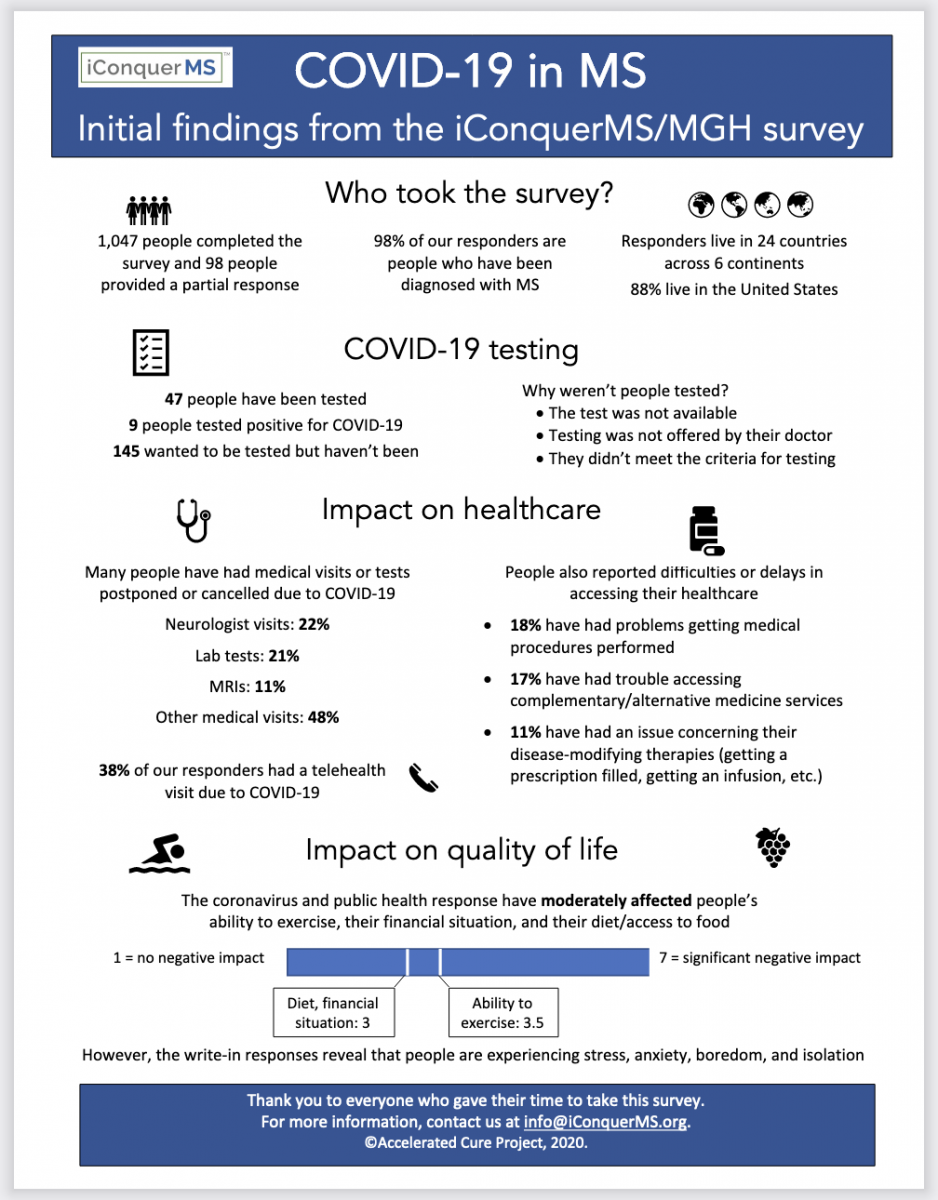
Key study findings include:
- At the beginning of the pandemic, a majority of people with MS reported interruptions to their regular MS care due to COVID-19 as well as limited access to COVID-19 testing.
- 10% reported changes to their normal MS treatment protocols
- Early in the pandemic, fewer than 1% reported a positive COVID-19 test, but more than half reported having symptoms
- Later in the pandemic, people with MS were about as likely as the general population to be infected with COVID-19.
- More than 75% of participants were willing to receive vaccines once they became available. Older individuals were more likely to want to get the vaccine while those with more disabilities were less likely. The greatest source of concern about the vaccines was safety.
- 27% of participants reported symptoms of depression and 15% reported experiencing anxiety. Those who were younger in age, who were female, or who had tested positive for COVID-19 were more likely to experience these effects.
What do these study findings mean?
These surveys tell us that COVID-19 has taken a significant toll on people with MS in terms of mental health and ability to maintain social connections. We also learned that the pandemic forced many people with MS to postpone medical care and disrupted MS treatment plans.
We also learned about the concerns and priorities of people with MS during the pandemic, including worry about being infected with COVID, concerns about activities associated with risk of exposure, and attitudes toward vaccination.
What will we do next with this information?
The results of the study have been published in a variety of formats (see below) to help inform education and treatment approaches, policies around access and health care delivery, and development of new research questions. iConquerMS has also used the results of these surveys when designing the COVER-MS study, our study of COVID-19 vaccinations in people with MS.
Learn more
Video: "Chat with Chat" interview with Dr. Farrah Mateen
Infographic: COVID-19 in MS PDF (118 KB)
Journal article (open-access): Impact of the COVID-19 pandemic on the health care of >1,000 people living with multiple sclerosis: A cross-sectional study
Journal article (open-access): COVID-19 vaccine hesitancy in multiple sclerosis: A cross-sectional survey
Journal article (open-access): Sociodemographic and clinical factors associated with depression, anxiety, and general mental health in people with multiple sclerosis during the COVID-19 pandemic
Abstract: Risk factors for COVID-19 infection in patients with multiple sclerosis: a nested case–control study
Share this project summary with others:
https://www.iconquerms.org/project-impact-COVID-MS
